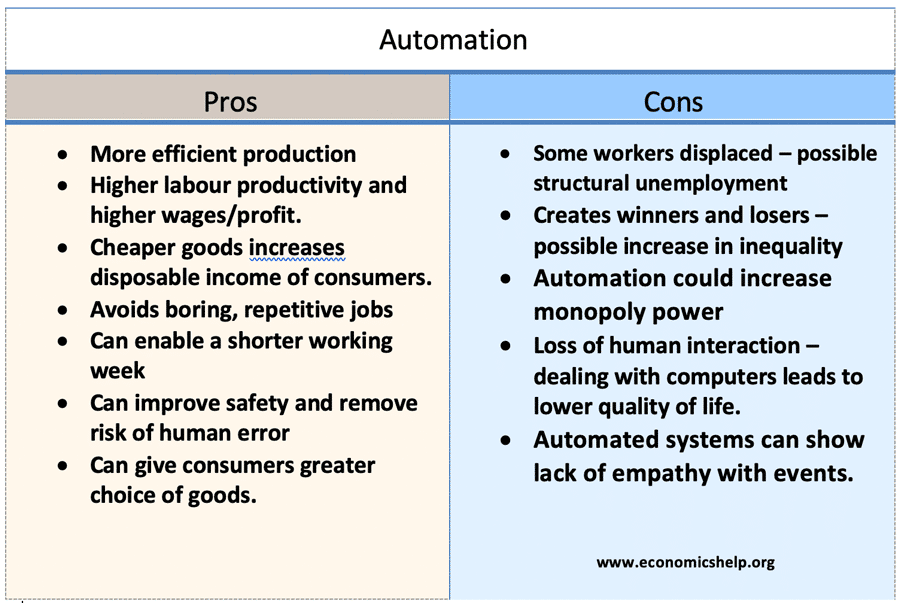Definition of automation
Automation refers to the process of automatically producing goods through the use of robots, control systems and other appliances with a minimal direct human operation.
Within manufacturing industries, automation has led to increased labour productivity as fewer workers are needed to produce the same number of manufactured goods.
A perceived downside of automation is that it leads to jobs being displaced in traditional areas of work – in particular, ’blue-collar’ manufacturing jobs. Less visible is how the process of automation leads to the creation of new jobs in areas such as robot manufacture, research, marketing and software development.
However, there are still concerns about the social and economic impact of the rapid job displacement associated with automation and globalisation. In fact, there is enduring concern automation is costing jobs – an idea some economists argue is just an enduring faith in the Luddite fallacy.

Benefits of automation for firms
- Automation enables firms to produce goods for lower costs. Automation leads to significant economies of scale – important in industries which require high capital investment.
- Automation enables firms to reduce number of workers, and this limits the power of trades unions and potentially disruptive strikes.
- Automation also enables a greater economy of scope. This means that one factory is able to produce a greater range of goods; this diversity and product differentiation is as important for firms as lower unit labour costs. In the 1950s, the goal was to produce goods as cheaply as possible. Now, consumers are looking for greater customisation of products. Automation enables consumers to be able to customise the size, look and function of your fridge – rather than just picking a standard model from the assembly line.
- Automation can also enable shorter lead times, quicker delivery and more efficient use of stock and cash flow.
- Automation can improve safety records by implementing automatic fail-safe mechanisms and reduce the risk of human error.
Costs of automation for firms
- Requires significant capital investment and the benefits may take several years to exceed current production methods.
- Firms that are under short-term pressures may be reluctant to take the investment needed and lag behind. Lack of investment in automation has been put forward for poor growth in labour productivity in US and UK.
- Requires more specialised labour to develop software and maintain machinery.
- Some forms of automation may put off consumers. For example, consumers may get frustrated speaking to a computer rather than dealing with a human on the end of the phone.
Benefits of automation for the economy

- In addition to the benefits accruing to firms, automation can have various benefits for wider society.
Consumers have gained the convenience of greater choice of goods and services. For example, ATM cash machines are a very simple example of automation which enables people to get cash when banks are closed. - Lower costs of production enable lower prices, leading to more disposable income to be spent on a wider range of services.
- Leads to the creation of new kinds of jobs, which are more creative, less repetitive and enable more flexible labour markets. For example, rather than do repetitive jobs in a factory, young workers can become software engineers to develop the ideas, design and methods that the robots will then make.
- More profitable firms should, in theory, enable governments to receive more tax revenue to spend on public goods.
- Automation is essential to remain internationally competitive. If one country doesn’t automate, production will shift to those countries who do, and then gain a comparative advantage.
Problems of automation for the economy
- It can create winners and losers. Some will benefit significantly from automation – owners of more profitable factories, and software developers. However, those who lose jobs from the process of automation, may struggle to gain equivalent employment.
- In recent years, there has been a rise in male unemployment and inactivity across western Europe / US. Globalisation and automation has been suggested as one reason for these higher structural rates of unemployment – especially amongst unskilled male workers. Even those who have found work, often find it is in the gig economy – zero hour contracts, involving low pay and uncertainty. This has created ill-feeling towards the direction of the economy – despite higher GDP.
- Impact on equality. The process of automation has co-incided with a rise in levels of inequality in UK and US. There are many reasons for the rise in inequality, but the fear is that some benefit from automation more than others.
- Automation may increase corporate profit, but not necessarily median wages. Since 2008, we have seen a rise in real GDP, but median wages have stagnated. Company profit has increased, but the share of tax revenue paid by companies is not increasing.
- Automation can increase monopoly power of the most successful technology firms, e.g. Apple, Amazon have all benefitted from automation to gain higher market share.
- Loss of human element. We are moving to a society where we have less personal contact – self-service till, automated announcements and buying online. It means we can avoid having human contact and although the economy may be efficient, it could create problems of loneliness and a sense of separation. This human touch is something not measured by economic statistics like GDP.
- For example, if a human is making announcements about trains, they can make jokes and entertain waiting passengers. An automated computerised announcement system has no sympathy, empathy, but is robotic. Uber uses an automated pricing mechanism. This meant during some crisis, the price of Ubers went through the roof. This gave the impression Uber was profiting from tragedy. (Uber later but cap on surge-pricing).
Future trends of automation
- 3d printing and automation of customised production are just in their infancy. Over the next few years/decades we could see a prolonged revolution in labour markets. Quite soon we could see driver-less taxi’s, and print on demand services for a whole range of goods. If this occurs, we could see further pressures on old fashioned styles of jobs. The labour market could see further fragmentation between ‘insiders/high skill’ and outsiders/low skill.
Conclusion
Automation is a major influence on the economy and will continue to be over the next decade. In theory, automation can lead to significant benefits for the whole economy. Greater GDP, higher productivity and increased customisation of the consumer experience. However, there are legitimate concerns about how these gains will be distributed. It is tempting to dismiss all concerns of new technology as the old Luddite fallacy. But, there is no guarantee that displaced workers will be seamlessly integrated into a very different labour market.
But, on the other hand, it would be a mistake to be too pessimistic. Past trends in automation have served the economy well. Who would go back to a time of 1 million people working as a coal miner or 90% of the population growing their own food? Automation will lead to new opportunities, and with increased technology, we could see the potential for a revitalisation of cottage industries – with self-employed workers having the ability to use their creativity to join a fast-changing economy.
Related
External links

Automation is becoming the order of the day, all important industrial processes are going to be automated. The future of our industry sectors lies with the automation of the processes. I agree with the author that automation is set to result to a lot of benefits but on the other hand, it is also going to impact on other sectors. For example, with the continued pace of automation, it is evident that many people will have lost their jobs since industries will not be relying on manual labor. However, I still feel that automation benefits outweigh the drawbacks.
Good review. Automation is inevitable, as the progress itself. This is what was happening in the past. This is what is going to happen in future. Humans need to adjust to changing economic needs. There is no way around it.
some benefits can be-
reduce human labor
improved quality
increase productivity
cost reduction
increase reliability and availability
You can also describe here obstacles on the way of Automation.
In india automation is not good for poor labour.
Automation is a wonderful idea. However in less developed countries such as India and Africa, automation tends to leave many people unemployed.
According to indian point of view Automation is not good.
As a Human being we are much advanced now…
Proof for that is automation… One automation machine can do 100s of worker’s work…
Automation is have pros and crons. But still this is useful to mankind.
I believe that there can be only one correct opinion: The world is developing, technologies are developing, and along with this, the professions that require mental abilities are getting bigger, the opposite, where only physical labor is needed – less. Automation is what is needed and what supplants physical labor, thereby creating a space for the development of mental work. The world changes irrevocably, and the question remains: do you change with him ?!
SSC exams take massive effects in the student’s life, and these are the first public examinations for the students, so students are worrying about the results, they are very panic about the examination results.
It got me when you said that automation will be able to make the rates lower since there will be lower costs in production. With that in mind, I will be getting one installed in our future property to ensure that our products can be bought by anyone. We will be producing skincare products which can cost a lot because of the way it is being made, so this tip will be very helpful.
i have a question why does it says benefit and cost?
You make some great logical comparisons in there! Thank you for sharing it with us . Automation is changing the world, but it’s hard to convince your team that AI’s a friend. We need to find a way to get overcome this fear of automation.
As a matter of fact everything has its pros and cons, if we want to develop we should be at par with the ever changing environment as “change is constant” no one can stop it. Most important aspect is we must stick to the most basic thing and that is everything revolves around “HUMAN” ignoring and surpassing without contributing it to the mankind is the initial phase of big disaster.
I have heard this argument many times ‘ more jobs are created than lost’ but the reality is the majority of us that work in manufacturing jobs don’t have or are incapable of the massive skill requirements to become a programmer or another high tech job which in turn of course means those that can not afford to go to university will in essence be unemployed. It doesn’t matter how cheap items become if you have no money to buy it anyway.
As you mentioned , automation requires a lot of investment however it is a necessary action to be cost combative in high volume production. But it is always a trade off issue if we are not considering high volume consumers product. If you are not able to use the same type of automation in for several products in low volume production the cost will be increased due to high investment of automation.